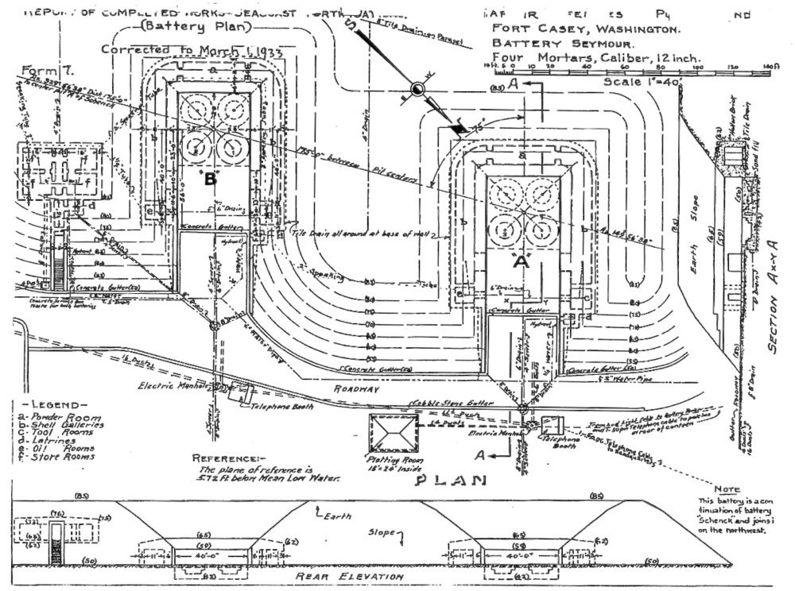Battery Seymour: Difference between revisions
John Stanton (talk | contribs) No edit summary |
John Stanton (talk | contribs) |
||
| Line 12: | Line 12: | ||
The four remaining mortars were removed in 1942, during [[World War II]]. | The four remaining mortars were removed in 1942, during [[World War II]]. | ||
{{FtCaseyBatterySeymour}} | {{FtCaseyBatterySeymour}} | ||
[[Image:FortCaseyBatterySeymour Plan.jpg|thumb|left|795px|Battery Seymour Plan]] | |||
{{clr}} | {{clr}} | ||
== Current Status == | == Current Status == | ||
Part of the [[Fort Casey]] State Park. The Battery is accessible to the public and the rooms are clean and dry but empty. No guns or carriages are in place. | Part of the [[Fort Casey]] State Park. The Battery is accessible to the public and the rooms are clean and dry but empty. No guns or carriages are in place. | ||
Revision as of 16:16, 31 August 2008
Battery Seymour (1899-1942) - Battery Truman Seymour is a concrete Endicott Period Battery located on Fort Casey, Washington. Named after Maj. Truman Seymour, 5th U.S. Artillery, bvt. Maj. Gen. USA, who rendered distinguished service in Mexican War and the U.S. Civil War, and died 30 Oct 1891 at Florence Italy. The Battery was begun in 1898, completed in 1899 and transferred to the Coastal Artillery for use 16 Jun 1902 at a total cost of $46,603.50. The mortars were dismounted in 1942 during World War II.
Battery Seymour History
Designed to protect both the Straight of Juan De Fuca and the Admiralty Inlet to Puget Sound. Originally built with eight 12" M1890 MI mortars on M1896 MI carriages in a concrete battery with two mortar pits. In May 1918 two mortars were removed from each pit leaving two mortars remaining in each pit. The mortars were removed because it proved difficult to load and fire four large mortars simultaneously and there was simply not enough room in the mortar pit for the number of men required. Each of the mortars was capable of firing a seven hundred pound shell nine miles and proved accurate enough to hit a moving practice target seven miles away in 1913. The four remaining mortars were removed in 1942, during World War II.
| Empl No |
Caliber Type |
Barrel Length |
Model | Serial No |
Manufacturer | Carriage | Service Dates |
Notes | |
|---|---|---|---|---|---|---|---|---|---|
| A-1 | 12" Mortar | 141.12" | M1890MI | 19 | Niles Tool Works | Mortar, M1896MII, #115, Providence |
1902-1942 | ||
| A-2 | 12" Mortar | 141.12" | M1890MI | 18 | Niles Tool Works | Mortar, M1896MII, #113, Providence |
1902-1918 | Removed 1918 | |
| A-3 | 12" Mortar | 141.12" | M1890MI | 59 | Watervliet | Mortar, M1896MII, #134, Am. Hoist & D. Co. |
1902-1942 | ||
| A-4 | 12" Mortar | 141.12" | M1890MI | 17 | Niles Tool Works | Mortar, M1896MII, #114, Providence |
1902-1918 | Removed 1918 | |
| B-1 | 12" Mortar | 141.12" | M1890MI | 60 | Watervliet | Mortar, M1896MII, #136, Am. Hoist & D. Co. |
1902-1942 | ||
| B-2 | 12" Mortar | 141.12" | M1890 | 5 | Watervliet | Mortar, M1896MII, #117, Providence |
1902-1918 | Removed 1918 | |
| B-3 | 12" Mortar | 141.12" | M1890 | 8 | Watervliet | Mortar, M1896MII, #138, Am. Hoist & D. Co. |
1902-1942 | ||
| B-4 | 12" Mortar | 141.12" | M1890MI | 53 | Bethlehem | Mortar, M1896MII, #135, Am. Hoist & D. Co. |
1902-1918 | Removed 1918 | |
| Source: CDSG, Berhow, Mark A. ed, American Seacoast Defenses: A Reference Guide, 2nd Edition, CDSG Press, McLean, VA, 2004, ISBN 0-9748167-0-1, pages 140-143, 217 | |||||||||

Current Status
Part of the Fort Casey State Park. The Battery is accessible to the public and the rooms are clean and dry but empty. No guns or carriages are in place.
|
{"selectable":false,"width":"500"} |
Location: Fort Casey, Washington Maps & Images Lat: 48.162216 Long: -122.676642 |
Sources:
Links:
Visited: 18 Jul 2008
Battery Seymour Picture Gallery
|
Click on the picture to see a larger version. Contribute additional pictures - the more the better! |